#Harmony Hammond
Text


Harmony Hammond
Gender: Female
Sexuality: Lesbian
DOB: 8 February 1944
Ethnicity: White - American
Occupation: Artist, activist, curator, writer, professor
#Harmony Hammond#lesbinism#wlw#lgbt#lgbtq#female#lesbian#1944#white#artist#activist#curator#writer#teacher
47 notes
·
View notes
Text
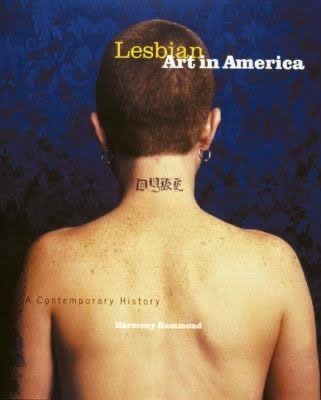
Harmony Hammond
Lesbian Art in America: A Contemporary History
The first definitive history of lesbian art in the United States presents a collection of artwork, created since 1970 within the context of gay culture and political activism, along with critical analyses of the movement and profiles of thirty prominent lesbian artists, including Kate Mill, Joan Snyder, Deborah Kass, and Catherine Opie.
Website : Harmony Hammond is an artist, art writer and independent curator. A leading figure in the development of the feminist art movement in New York in the early 1970s, she was a co-founder of A.I.R., the first women’s cooperative art gallery in New York (1972) and Heresies: A Feminist Publication on Art & Politics (1976). Since 1984, Hammond has lived and worked in northern New Mexico, teaching at the University of Arizona, Tucson from 1989–2006. Hammond’s earliest feminist work combined gender politics with post-minimal concerns of materials and process, frequently occupying a space between painting and sculpture – a focus that continues to this day.
7 notes
·
View notes
Text
Mistborn british cooking show!au
-Ati and Leras are judges with completely different views on how well done a tart should be
-poor sazed just trying to make a well done cream cheese tart but his copperminds did not prepare him for this :(
-kelsier what the fuck you were ment to make a tart but you made fuckin steak
-spook is crying and covered I'm jam (the cooking challenge did not involve jam)
-vin did not understand and made a table (its a very good table)
-ham made a great cream cheese tart but leras and ati were fighting about if it was done right so lost
-breeze: and now we add TwO ShOtS oF VoDkA
-Marsh legit did a good job even though he didn't know what cream cheese was 20 minutes before the challenge
-elend is confused and trying his best but he has no clue what he's doing yet made a decent tart somehow
-Yeden can cook a meal but not a tart, he is more confused than elend
-rashek cooked the best meal
#cosmere#mistborn#cfsbf#sazed mistborn#sazed#cosmemes#harmony mistborn#marsh mistborn#kelsier mistborn#cosmere memes#breeze mistborn#Hammond mistborn#Ham mistborn#elend venture#vin#vin venture#lord ruler#rashek#Spook mistborn#lestibournes#leras#ati mistborn#Lerati#Yeden mistborn#alternate universe#faith speaks
160 notes
·
View notes
Text
the final chorus of Scared by Albert Hammond Jr has me in a CHOKEHOLD
#the HARMONIES#incredible…#also has a star studded cast#albert hammond jr#julian casablancas#AND#sean lennon#?????#insane#Elliott if you see this post…#…no you don’t#the strokes#yours to keep#AHJ
17 notes
·
View notes
Text
Beres Hammond Kicks Off His New Year With "Let Me Help You" Video
On August 28, Jamaican music legend Beres Hammond OJ celebrated his 69th birthday. With a career spanning over 50 years, it’s definitely a blessing for the Singer to still have life, and still giving the world great music. He celebrated his new year with the release of the Music Video for the single, “Let Me Help You“.
The Music Video for Beres Hammond’s “Let Me Help You” displays good times with…
#13thstreetpromo#13thstreetpromotions#Beres Hammond#blog#Harmony House Productions#jamaica#jamaican#Let Me Help You#music#music video#reggae#singer#video#wordpress#youtube
0 notes
Text
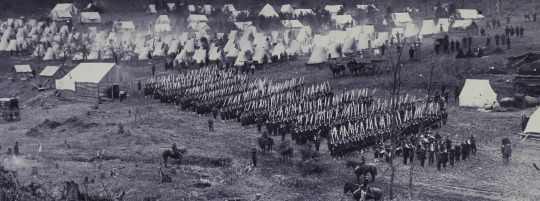
LETTERS FROM AN AMERICAN
April 12, 2024
HEATHER COX RICHARDSON
APR 13, 2024
At 4:30 a.m. on April 12, 1861, Confederate forces fired on Fort Sumter, a federal fort built on an artificial island in Charleston Harbor.
Attacking the fort seemed a logical outcome of events that had been in play for at least four months. On December 20, 1860, as soon as it was clear Abraham Lincoln had won the 1860 presidential election, South Carolina lawmakers had taken their state out of the Union. “The whole town [of Charleston] was in an uproar,” Elizabeth Allston recalled. “Parades, shouting, firecrackers, bells ringing, cannon on the forts booming, flags waving, and excited people thronging the streets.”
Mississippi had followed suit on January 9, 1861; Florida on January 10; Alabama on January 11; Georgia on January 19; Louisiana on January 26; and Texas on February 1. By the time Lincoln took the oath of office on March 4, 1861, seven southern states had left the Union and formed their own provisional government that protected human enslavement.
Their move had come because the elite enslavers who controlled those southern states believed that Lincoln’s election to the presidency in 1860 itself marked the end of their way of life. Badly outnumbered by the northerners who insisted that the West must be reserved for free men, southern elites were afraid that northerners would bottle up enslavement in the South and gradually whittle away at it. Those boundaries would mean that white southerners would soon be outnumbered by the Black Americans they enslaved, putting not only their economy but also their very lives at risk.
To defend their system, elite southern enslavers rewrote American democracy. They insisted that the government of the United States of America envisioned by the Founders who wrote the Declaration of Independence had a fatal flaw: it declared that all men were created equal. In contrast, the southern enslavers were openly embracing the reality that some people were better than others and had the right to rule.
They looked around at their great wealth—the European masters hanging in their parlors, the fine dresses in which they clothed their wives and daughters, and the imported olive oil on their tables—and concluded they were the ones who had figured out the true plan for human society. As South Carolina senator James Henry Hammond explained to his colleagues in March 1858, the “harmonious…and prosperous” system of the South worked precisely because a few wealthy men ruled over a larger class with “a low order of intellect and but little skill.” Hammond dismissed “as ridiculously absurd” the idea that “all men are born equal.”
On March 21, 1861, Georgia’s Alexander Stephens, the newly-elected vice president of the Confederacy, explained to a crowd that the Confederate government rested on the “great truth” that the Black man “is not equal to the white man; that…subordination to the superior race is his natural and normal condition.” Stephens told listeners that the Confederate government “is the first, in the history of the world, based upon this great physical, philosophical, and moral truth.”
Not every white southerner thought secession from the United States was a good idea. Especially as the winter wore into spring and Lincoln made no effort to attack the South, conservative leaders urged their hot-headed neighbors to slow down. But for decades, southerners had marinated in rhetoric about their strength and independence from the federal government, and as Senator Judah P. Benjamin of Louisiana later wrote, “[t]he prudent and conservative men South,” were not “able to stem the wild torrent of passion which is carrying everything before it…. It is a revolution...of the most intense character…and it can no more be checked by human effort, for the time, than a prairie fire by a gardener’s watering pot.”
Southern white elites celebrated the idea of a new nation, one they dominated, convinced that the despised Yankees would never fight. “So far as civil war is concerned,” one Atlanta newspaper wrote in January 1861, “we have no fears of that in Atlanta.” White southerners boasted that “a lady’s thimble will hold all the blood that will be shed” in establishing a new nation. Senator James Chesnut of South Carolina went so far as to vow that he would drink all the blood shed as a consequence of southern secession.
Chesnut’s promise misread the situation. Northerners recognized that if Americans accepted the principle that some men were better than others, and permitted southern Democrats to spread that principle by destroying the United States, they had lost democracy. "I should like to know, if taking this old Declaration of Independence, which declares that all men are equal upon principle, and making exceptions to it, where will it stop?” Lincoln had asked in 1858.
Northerners rejected the white southerners’ radical attempt to destroy the principles of the Declaration of Independence. They understood that it was not just Black rights at stake. Arguments like that of Stephens, that some men were better than others, “are the arguments that kings have made for enslaving the people in all ages of the world,” Lincoln said. “You will find that all the arguments in favor of king-craft were of this class; they always bestrode the necks of the people, not that they wanted to do it, but because the people were better off for being ridden…. Turn in whatever way you will—whether it come from the mouth of a King, an excuse for enslaving the people of his country, or from the mouth of men of one race as a reason for enslaving the men of another race, it is all the same old serpent….”
Northerners rejected the slaveholders’ unequal view of the world, seeing it as a radical reworking of the nation’s founding principles. After the Confederates fired on Fort Sumter, Lincoln called for 75,000 to put down the rebellion against the government. He called for “loyal citizens to favor, facilitate, and aid this effort to maintain the honor, the integrity, and the existence of our National Union, and the perpetuity of popular government; and to redress wrongs already long enough endured.”
Like their southern counterparts, northerners also dismissed the idea that a civil war would be bloody. They were so convinced that a single battle would bring southerners to their senses that inhabitants of Washington, D.C., as well as congressmen and their wives packed picnics and took carriages out to Manassas, Virginia, to watch the Battle of Bull Run in July 1861. They decamped in panic as the battle turned against the United States army and soldiers bolted past them, flinging haversacks and rifles as they fled.
For their part, southerners were as shocked by the battle as the people of the North were. “Never have I conceived,” one South Carolina soldier wrote, “of such a continuous, rushing hailstorm of shot, shell, and musketry as fell around and among us for hours together. We who escaped are constantly wondering how we could possibly have come out of the action alive.”
Over the next four years, the Civil War would take more than 620,000 lives and cost the United States more than $5 billion. By 1865, two-thirds of the assessed value of southern wealth had evaporated; two-fifths of the livestock— horses and draft animals for tilling fields as well as pigs and sheep for food— were dead. Over half the region's farm machinery had been destroyed, most factories were burned, and railroads were gone, either destroyed or worn out. But by the end of the conflagration, the institution of human enslavement as the central labor system for the American South was destroyed.
On March 4, 1865, when a weary Lincoln took the oath of office for a second time, he reviewed the war’s history. “To strengthen, perpetuate and extend [slavery] was the object for which the insurgents would rend the Union even by war while the government claimed no right to do more than to restrict the territorial enlargement of it,” he said. “Neither party expected for the war the magnitude or the duration which it has already attained. Neither anticipated that the cause of the conflict might cease with or even before the conflict itself should cease. Each looked for an easier triumph and a result less fundamental and astounding.
“Both read the same Bible and pray to the same God and each invokes His aid against the other. It may seem strange that any men should dare to ask a just God’s assistance in wringing their bread from the sweat of other men’s faces but let us judge not that we be not judged. The prayers of both could not be answered—that of neither has been answered fully. The Almighty has His own purposes.”
“Both parties deprecated war but one of them would make war rather than let the nation survive, and the other would accept war rather than let it perish,” he said.
“And the war came.”
LETTERS FROM AN AMERICAN
HEATHER COX RICHARDSON
#American Civil War#Heather Cox Richardson#Letters From Am American#racism#created equal#equality#Fort Sumpter#The South#income inequality#American's DNA
20 notes
·
View notes
Text
CONSIDER THE HAMMOND ORGAN! A WONDERFUL MACHINE! PART FLESH, PART MUSIC! ITS HARMONIES WILL SIMULTANEOUSLY LULL AND ROCK YOU TO A STATE OF PURE DIVINE ECSTASY! In the times of ancient, many blasphemous engineers have attempted to recreate an instrument that could closely approximate that of a seraphim’s call at the throne of G-O-D. But none could succeed, FOR THE HAMMOND ORGAN WAS SENT FROM ABOVE TO PUT MORTAL HANDS TO SHAME! SHAME! SHAME! SUSTAIN? YES! THE SUSTAIN PEDAL OF THE HAMMOND ORGAN— a simple device at first glance, but do not underestimate it! Functioning as the lungs of the organ (ISNT IT WONDERFUL! THE ORGANS OF ORGANS!) this awesome pedal allows the machine to SING! Long notes that give melody it’s sexuality! Make no mistake, by playing the Hammond organ, YOU TOO ARE A PART OF THE OVERWHELMING CIRCUIT THAT FLOWS DREAMS TO REALITY! YOU MUST BOND WITH THE HAMMOND ORGAN, YOU MUST LOVE IT LIKE A MOTHER!. GIVER OF NUTRIENT LIFE! Yes yes yes, the Hammond Organ is a machine like NO OTHER !




18 notes
·
View notes
Text
Happy Birthday, Rick Wright! (July 28, 1943)

"Rick was so incredibly shy that he hardly spoke." - Clive Metcalfe
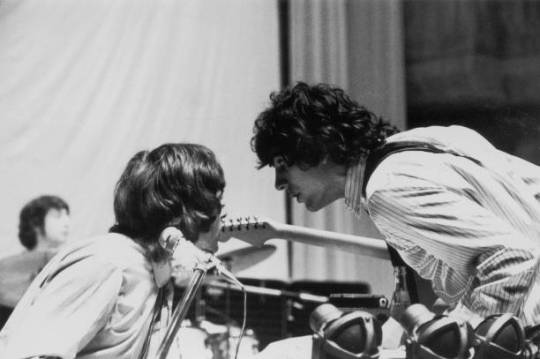
"I remember Rick sorting out the harmonies and telling everyone what to sing. I think everyone, including me, underestimated Rick. It's the classic management thing: he wasn’t any trouble, so you tended not to notice him." - Peter Jenner
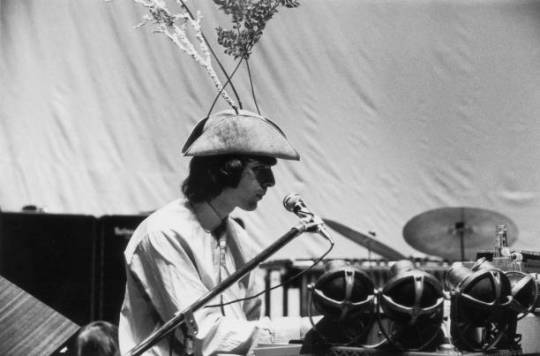
"A lovely chap, but a bit away with the fairies." - a former Floyd roadie

"Rick was a very shy and quiet guy. He was extremely beautiful, gentle and talented." - Jill Furmanovsky

"He was by far the quietest of the band. And probably harder to get to know than the rest of us." - Nick Mason

"There is this image of Rick sat working something out on the keyboards while a war went on around him between the rest of us." - Nick Mason
"Rick would sit at the back and not say anything for days, but his playing was the highlight of any session." - John Leckie

"It's almost that George Harrison thing. You sort of forget that they did a lot more than perhaps they're given credit for. Like George, Rick wrote, he sang, he did a lot of things, but he did become eclipsed by everyone else." - Nick Mason

"The blend of Rick's and my voices and our musical telepathy reached their first major flowering in 1971 on Echoes. All the greatest Pink Floyd moments are the ones where he is in full flow." - David Gilmour
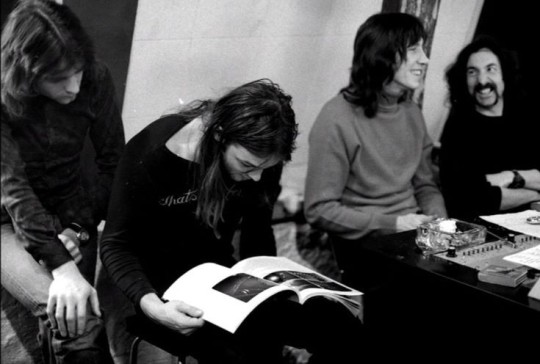
"Rick's got his character flaws. He can be a bit of a grumbler, but we get on. Rick's got soul. A real soul - a complete relationship with his playing." - David Gilmour
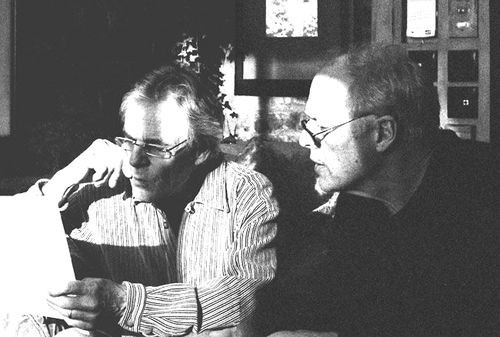
"We didn’t spend our time being close, but we had a musical telepathy and, at its best, we knew exactly what the other was going to do and could bounce off each other. Rick had his moments of being rather down about various things, and towards what was the end of his life – none of us knew that at the time – he came on board to do my On An Island tour and had the time of his life.
We’d get to a certain moment in the set where I was introducing people, and Polly would shout [French accent] “Reee-shard! Reee-shard!” And then people in the audience who’d been there the night before noticed and started shouting it too, and it grew and grew every show, and he visibly puffed up with joy! I really think that helped boost his confidence and he started playing more effusively. We just felt he should be fêted a little, as he was so retiring and tended to be in the background, and I’m up the front there and I’m, you know, big and strong. So he had the time of his life and really loved it and was playing brilliantly." - David Gilmour
And some quotes from the man himself:
"We have great understanding and tolerance of each other. But there are a lot of things left unsaid. I feel. Sometimes." (1972)
"I'm not technically a great pianist. I was saying to someone the other day that I wish I could play honky-tonk piano. I listen to Dr John and appreciate what he does, but then can he play the Hammond like I can? I look at myself as more of a writer than an actual performer. I can't play the piano fast - I'm no Oscar Peterson - and I can't read music. Sometimes, I wish I could sit down and play a wonderful piano concerto." (1996)
"I wasn’t close to David when he joined but I am now. He may not feel that, but it’s what I feel!" (2007)
Q: Who wrote Echoes?
Rick: Me?!
25 notes
·
View notes
Text

Harmony Hammond, Bandaged Grid #8, 2018, oil and mixed media on canvas, 64 x 73 in., 162.6 x 185.4 cm, Courtesy Alexander Gray Associates, New York, © ADAGP, Paris
2 notes
·
View notes
Text

The Roches - Metropol, Berlin, Germany, November 3, 1982
Sometimes, nothing but The Roches sounds good. Here, we've got an excellent Rockpalast performance from around the time of the Keep On Doing LP. Maggie, Terre and Suzzy kick things off in fine fashion with that album's "Losing True," sending laser beams of pure harmony out into the crowd of rowdy Berliners. Somehow, that crowd remains a little rowdy throughout the Roches set — how??? Well, it turns out they were waiting for the Go-Go's, who were riding high on a few new wave hits at the time. Can we check out the Go-Go's, too? Oh yeah, we can.
But before you do that, dig the one-two punch that The Roches close with — Dylan's "Clothesline Saga" and "Hammond Song." That Dylan cover is an especially inspired choice, allowing the sisters to inhabit a number of characters and voices, uttering gnomic riddles and otherwise unspeakable truths beneath everyday exchanges. That's kinda the same thing that happens on "Hammond Song," too. Has Bob ever listened to "Hammond Song"? I bet he has.
10 notes
·
View notes
Text
Nickel Bin #2:
The Roches' Hammond Song

Some songs have no peers.
There's nothing comparable to Dylan's Like a Rolling Stone: while his efforts to write another anthem are many, and they vary from the successful (Knocking on Heaven's Door) to the underappreciated (Changing of the Guard) to the overrated (Gotta Serve Somebody) to the annoying unless you are in a very weird mood (Brownsville Girl), he, and everybody else, has never come close to a comparable synergy of warmth, anger and energy.
I think The Roches' Hammond Song is equally unique. Suzzy, Terre and Maggie Roche never climbed a musical mountain like it again in their fitful, joyful and far too short career together, and I don't know any other song or group that presents such bizarre and daring vocals (they range from startlingly androgynous to winningly effete and back again); where else can you hear three such utterly distinct voices sharing a space with such elegance? Add to that mix the unique layers afforded by the song's length and its guitar solos, plus its confusing but vital story, and you've got yourself a masterpiece.
Let's listen.
youtube
First of all they're not singing about Heaven. They're singing about Hammond, Louisiana and Maggie and Terre's decision, years earlier, to ditch their budding music career altogether. It seems there was a Kung Fu school (seriously!) in Hammond that a friend was running and that seemed like a better place to be than in New York City, wearing clothes assigned to them by their record company.
The song is a natural cousin to Cat Stevens' Father and Son: In Hammond Song The Roches present a musical debate between the patriarchs in their life and themselves; they sing both sides of the argument and they let you choose the winner.
The song opens with a long, suspenseful opening that gives way to warm strumming and then the refrain's three part harmony. But then it swerves for the first wild time into Maggie Roche alone, and she's telling the band they're "on the wrong track". What other voice is like hers? I'm afraid my sexist biases hear her unique contralto and summon up a woman on a motorcycle with arms the size of my thighs who smokes six packs a day and would happily kick my ass while having yet another. But here she is:

Maggie died 6 or 7 years ago. My famous brother's friend Ryan, who recently bought me a very delicious beer at a Yo La Tengo show, sobbed when he heard the news. The more time I spend listening to Maggie's music, the more I understand where he was coming from. Just take a listen to Quitting Time from the same record:
youtube
At the end of each section of Hammond Song The Roches hit and hold a high, odd and transfixing note. You can hear it for the first time on the Ooooo after the first section, soon after Maggie's introduces her voice. That same note, or one close to it anyway, comes back again before the first guitar solo on "you're LYYYYYYing to me", then again on "don't be a FOOOOL."
When CS&N reach for a note like that I wonder just what the hell I'm doing with my life. When Linda Ronstadt, Dolly Parton and Emmylou Harris finally threw off the concerns of their record companies in the mid-80's and came together as a bluegrass version of The Roches they hit some angelic notes, yes, but they never sounded weird. Such weirdness is a big part of Hammond Song's, and the band's, genius.
And capturing that weirdness, and that note, is still a goal for a new bands. Check out Meg Baird search for and then find it - and then keep it for an impossible, audacious length, at 3:15 mark of Heron Oblivion's seismic Your Hollows:
youtube
Next time I get an hour with Baird in a bar I'll ask her about Hammond Song as a basis for Your Hollows instead of quizzing her on Mike Heron. Poor Meg. I suppose she's been warned.
And now that you have Heron Oblivion in your ears, let's talk about Hammond Song's guitar solos. That's Robert Fripp, of King Crimson/Eno/Bowie/Talking Heads fame, making himself known. He walks a careful and skillful line in his production of the song and the record around it: you never forget he's there but he never gets in the way. This is the sisters' record and the sisters' song. But wow, what a guitar sound he achieves: it's nearly as weird as the vocals, part theremin, part Hendrix, all magic.
Finally, Hammond Song avoids easy cliche in its storytelling as well. Okay, their male authorities wanted them to put on sexy dresses and stop being weird, but the girls said no and became their awesome selves instead:

Lesser artists would have wrapped the story up with victory. But Maggie and her sisters know it's not that simple. When they released Hammond Song their story was far from over: the record could have tanked; it could have proved the record company right.
And so The Roches bring us into the debate; they let us decide whether their defiance in life and in the song are justified. "Tell me," they appeal to us in the song's conclusion, "I'm okay."
youtube
Dear Suzzy, Terre and Maggie,
You are not okay. You are the best.
Sincerely,
The Nickel Bin
19 notes
·
View notes
